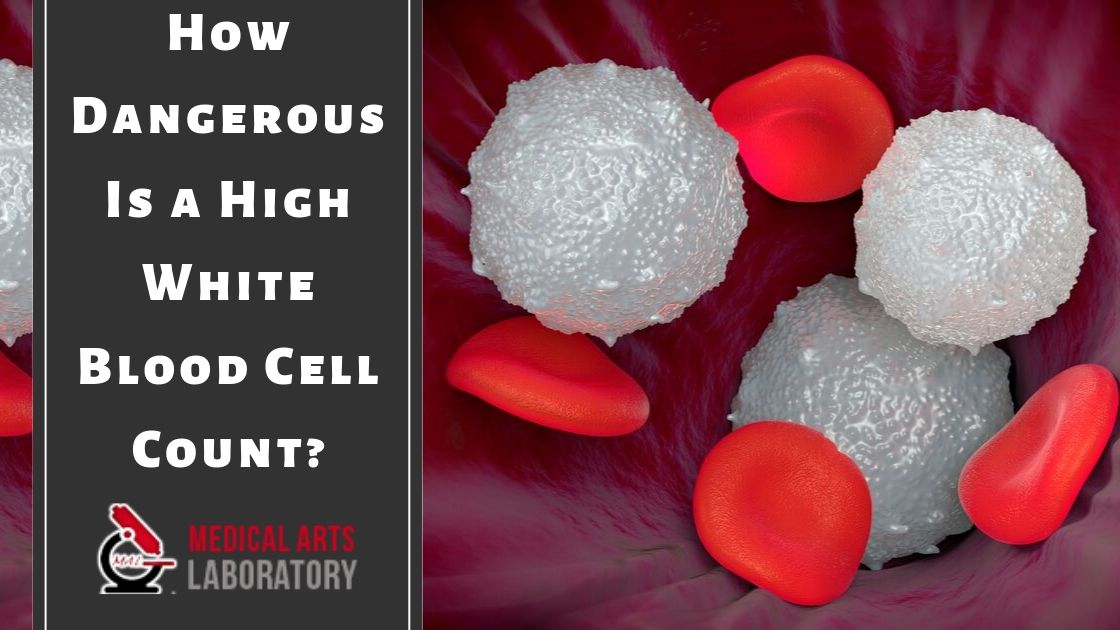
07 Oct How Dangerous Is a High White Blood Cell Count?
Whether or not you remember much about blood cell types from your high school biology class, there may come a time when such knowledge is important. Case in point: The role that white blood cells (WBCs) play in your health. We’ll cover specifics soon, but know that a WBC count is always included in a complete blood count (CBC) blood test. This is typically ordered by your physician as part of your annual health examination, or to diagnose a condition that would affect the number of WBCs. An elevated WBC can indicate several conditions that may require monitoring or treatment.
What is White Blood Cell Count?
White blood cells help your body fight off infections and disease as part of your immune system in order to keep your body healthy. Your body will generally produce more white blood cells when you are ill, and maintain an average white blood cell count the rest of the time. Also referred to as leukocytes, white blood cells only make up about 1% of the blood cells in your body. Despite the small percentage, their impact is huge. White blood cells, red blood cells and platelets are the three primary types of cells which make up your blood and are all produced by your body’s bone marrow.
White blood cells are small but mighty — your body produces about 100 billion of them every day! For every microliter of blood, there can be approximately between 4,000-11,000 WBCs. Your WBC count number, whether low or high, can reveal signs of an infection, emotional or physical stress, cancers and more.
The five main types of white blood cells and their average count number per microliter are:
- Lymphocytes: 1,500-3,000
- Neutrophils: 3,150-6200
- Basophils: 15-20
- Eosinophils: 50-250
- Monocytes: 300-500
What Happens if Your White Blood Cell Count is too High?
If your white blood cell count is high, there’s a chance you may already be feeling some of the potential symptoms. Signs of an infection or inflammation are likely the result of an elevated white blood cell count. Individuals with an immune disorder or certain types of cancer are also likely to experience abnormal white blood cell counts, both low and high. While feeling ill can be a sign of a high blood cell count, it’s also possible you will have no noticeable symptoms at all. An elevated WBC count in itself is not usually dangerous, but the causes of it can be if left untreated. On average, your body is naturally designed to produce white blood cells when needed and reduce them when you have regained normal health.
What Is Indicated by a High WBC Count?
There are multiple potential causes and indications of a high WBC count, which is why a complete blood count test is just one tool of many used by medical professionals to make accurate diagnoses and treatment plans.
A high white blood cell count may indicate:
- Infection, viral or bacterial
- Inflammation, including rheumatoid arthritis
- Immunosuppression
- An immune disorder
- Bone marrow disease (myelofibrosis)
- An allergic reaction
- A reaction to medication, such as epinephrine or corticosteroids
- Cancer, such many forms of leukemia
- Tuberculosis
- Polycythemia vera
- Whooping cough
Other causes of an elevated white blood cell count can be less severe, which may include smoking, injury, emotional stress, pregnancy, labor, or excessive exercise. Some individuals with a high WBC count number may have no identifiable cause, yet still experience serious symptoms. This is identified as idiopathic hypereosinophilic syndrome, and can lead to damage to the nervous system, heart, lungs, liver and skin.
What Are the Ways to Reduce White Blood Cells?
Some conditions that cause an increase in white blood cells cannot be prevented. However, there are ways to reduce your high white blood cell count in the form of adopting healthier diet choices.
Foods rich in these nutrients should be included to help lower your WBC count:
- Antioxidants — Help neutralize harmful molecules known as free radicals. You can get antioxidants by consuming tea, onions, leeks, garlic, grapes and many other fruits and vegetables.
- Vitamin C — Help regulates your WBC levels. You can get Vitamin C by consuming citrus, berries, pineapples, guavas, papayas, bell peppers, carrots, broccoli, cauliflower and more.
- Omega-3 Fatty Acids — Help improve cardiovascular health and increase activity of phagocytes to help fight bacteria. You can get omega-3 fatty acids by consuming fatty fish such as salmon, trout or herring, as well as in walnuts and flaxseed.
You can also improve your diet for both your white blood cell count and your overall health by avoiding foods especially high in saturated fats, sugars, and salt. Any foods that help reduce inflammation will be especially beneficial to use as a replacement. These replacements can include nuts, soy protein, spices, garlic, vinegar, green and black teas, and grapes.
Testing for White Blood Cell Count
The surest way to determine your WBC count is with a blood test. If your doctor has recommended a CBC test to check your WBC count or other blood levels, see Medical Arts Laboratory for quick, accurate results. Serving Central Florida for over 20 years, we provide an extensive list of blood testing services. We accept most major insurance plans, and have competitive self-pay prices. Contact us today.




No Comments